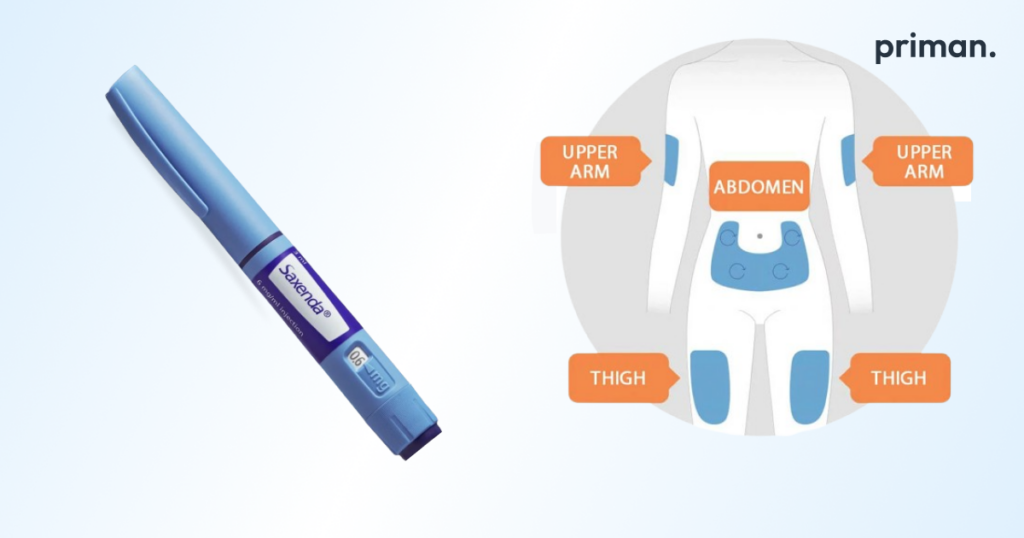GLP-1 receptor agonists, often referred to as GLP-1 injections, have emerged as a game-changer in the management of type 2 diabetes and, increasingly, for weight loss/management. If you’re in the UK and considering GLP-1 injections, let’s delve into the pros and cons of GLP-1 injections, supported by clinical evidence, to help you make an informed decision.
What are GLP-1 medications?
GLP-1 receptor agonists are a type of medication that works like a natural hormone in your body called glucagon-like peptide-1 (GLP-1). This hormone helps control your blood sugar levels and how hungry you feel.
These medications are available in two main forms: injections and tablets, both designed for weight loss. Some popular examples of injectable GLP-1 receptor agonists include liraglutide (Saxenda) and semaglutide (Ozempic, Wegovy). Rybelsus (semaglutide) is the first tablet form of a GLP-1 receptor agonist approved for weight management.
How Does GLP-1 Work?
- Stimulates Insulin Release: When you eat, GLP-1 signals your pancreas to release insulin. Insulin helps your body’s cells absorb glucose (sugar) from the bloodstream, thus lowering blood sugar levels.
- Suppresses Glucagon Production: GLP-1 also curbs the production of glucagon, another hormone that raises blood sugar levels.
- Slows Gastric Emptying: GLP-1 slows down the rate at which food leaves your stomach, making you feel full and satisfied for longer. This can help reduce food intake and contribute to weight loss.
- Acts on the Brain: GLP-1 also affects the brain, influencing appetite and food cravings.
GLP-1 Landscape in the UK
The National Institute for Health and Care Excellence (NICE) recognizes the potential of GLP-1 receptor agonists for weight management in specific patient groups within the UK healthcare system. These medications are typically prescribed alongside lifestyle changes such as a healthy diet and exercise for individuals with a body mass index (BMI) of 35 or above or those with a BMI of 30 to 34.5 who also have weight-related health conditions like type 2 diabetes.
GLP-1 Injections in UK
GLP-1 injections have become increasingly popular in the UK for managing type 2 diabetes and weight loss. If you’re considering this treatment option, here’s a list of the currently available GLP-1 injections in the UK:
- Generic Name: Semaglutide
- Frequency: Once-weekly injection
Brand Name: Mounjaro
- Generic Name: Tirzepatide
- Frequency: Once-weekly injection
Brand Name: Trulicity
- Frequency: Once-weekly injection
Brand Name: Victoza, Saxenda
- Generic Name: Liraglutide
- Frequency: Once-daily injection
While all these GLP-1 injections are available in the UK, some may be experiencing supply shortages or restrictions due to high demand. GLP-1 injections are prescription-only medications. You’ll need to consult with your healthcare professional to determine if they are suitable for you. Choosing the Right GLP-1 Injection will depend on your individual circumstances, including your medical history, treatment goals, and preferences.
To make an informed decision about your weight loss journey. Read our blog post comparing injections and tablets today!
Pros of GLP -1 Injections
- Effective Blood Sugar Control:
- GLP-1 injections stimulate insulin release in a glucose-dependent manner, meaning they only work when blood sugar levels are high, reducing the risk of hypoglycemia (low blood sugar).
- Clinical trials consistently demonstrate significant reductions in HbA1c (a measure of long-term blood sugar control) with GLP-1 injections.
- A meta-analysis published in The Lancet showed an average HbA1c reduction of 1-1.5% with GLP-1 receptor agonists.
- Weight Loss:
- GLP-1 injections promote weight loss by slowing down stomach emptying, leading to increased satiety and reduced food intake.
- Studies have shown an average weight loss of 5-22% with GLP-1 injections, making them a valuable tool for people with type 2 diabetes who are overweight or obese.
- The STEP 1 trial demonstrated an impressive 15.3% weight loss with semaglutide (a GLP-1 injection) in people without diabetes.
- Cardiovascular Benefits:
- GLP-1 injections have been shown to reduce the risk of major cardiovascular events, such as heart attack and stroke, in people with type 2 diabetes and established cardiovascular disease.
- The LEADER trial showed a 13% reduction in major cardiovascular events with liraglutide (a GLP-1 injection).
- These cardiovascular benefits are independent of weight loss and blood sugar control, suggesting additional protective mechanisms.
- Potential for Beta-Cell Preservation:
- GLP-1 injections may help preserve the function of beta cells in the pancreas, which are responsible for producing insulin.
- This could potentially delay the progression of type 2 diabetes and reduce the need for insulin therapy in the long run.
Cons of GLP -1 Injections
- Gastrointestinal Side Effects: The most common side effects of GLP-1 injections are nausea, vomiting, and diarrhoea, which usually occur at the start of treatment and tend to improve over time. These side effects can be managed by starting with a low dose and gradually increasing it, as well as taking the medication with food.
- Risk of Pancreatitis: Although rare, GLP-1 injections have been associated with a slightly increased risk of pancreatitis (inflammation of the pancreas). If you experience severe abdominal pain, seek medical attention immediately.
- Cost: GLP-1 injections can be expensive, and their availability on the NHS may vary depending on the guidelines and individual circumstances. Discuss the cost and potential financial assistance options with your healthcare professional.
- Not a Cure: GLP-1 injections are not a cure for type 2 diabetes or weight management. You’ll still need to follow a healthy diet, exercise regularly, and possibly take other supplements coupled with GLP 1 injection.
Conclusion:
GLP-1 injections offer significant benefits for people with type 2 diabetes, including improved blood sugar control, weight loss, and cardiovascular protection. While they do have some potential side effects and cost considerations, the clinical evidence supports their use as a valuable treatment option. Consulting a healthcare professional is crucial to determine if these medications are suitable for you and to develop a personalised plan.
References
Aldawsari, M. et al. (2023) “The efficacy of GLP-1 analogues on appetite parameters, gastric emptying, food preference and taste among adults with obesity: Systematic review of randomised controlled trials,” Diabetes, metabolic syndrome and obesity: targets and therapy, 16, pp. 575–595. doi: 10.2147/dmso.s387116.
Alavi, S. E. and Ebrahimi Shahmabadi, H. (2021) “GLP-1 peptide analogs for targeting pancreatic beta cells,” Drug discovery today, 26(8), pp. 1936–1943. doi: 10.1016/j.drudis.2021.03.032.
Bergmann, N. C. et al. (2023) “Semaglutide for the treatment of overweight and obesity: A review,” Diabetes, obesity & metabolism, 25(1), pp. 18–35. doi: 10.1111/dom.14863.
Brady, S. M., Kane, M. P. and Busch, R. S. (2016) “GLP-1 agonist use in a patient with an explainable cause of pancreatitis,” AACE clinical case reports, 2(2), pp. e82–e85. doi: 10.4158/ep15658.cr.
Buse, J. B. et al. (2020) “Cardiovascular risk reduction with liraglutide: An exploratory mediation analysis of the LEADER trial,” Diabetes care, 43(7), pp. 1546–1552. doi: 10.2337/dc19-2251.
Caruso, I. et al. (2023) “Glucometabolic outcomes of GLP-1 receptor agonist-based therapies in patients with type 2 diabetes: a systematic review and network meta-analysis,” EClinicalMedicine, 64(102181), p. 102181. doi: 10.1016/j.eclinm.2023.102181.
Lisa Catanese, E. L. S. (2024) GLP-1 diabetes and weight-loss drug side effects: “Ozempic face” and more, Harvard Health. Available at: https://www.health.harvard.edu/staying-healthy/glp-1-diabetes-and-weight-loss-drug-side-effects-ozempic-face-and-more









